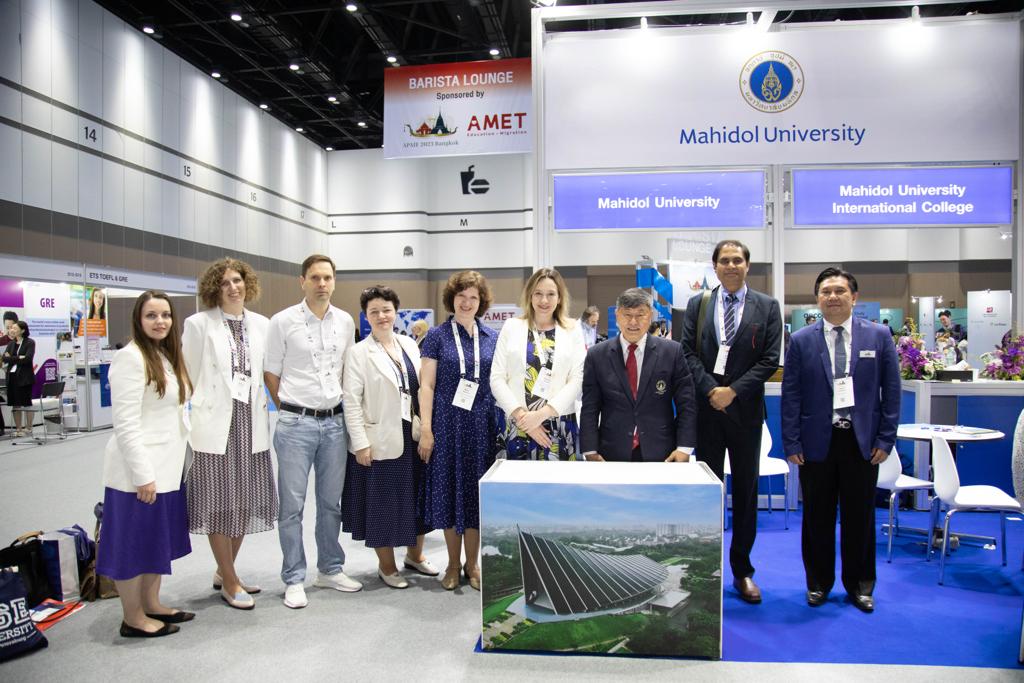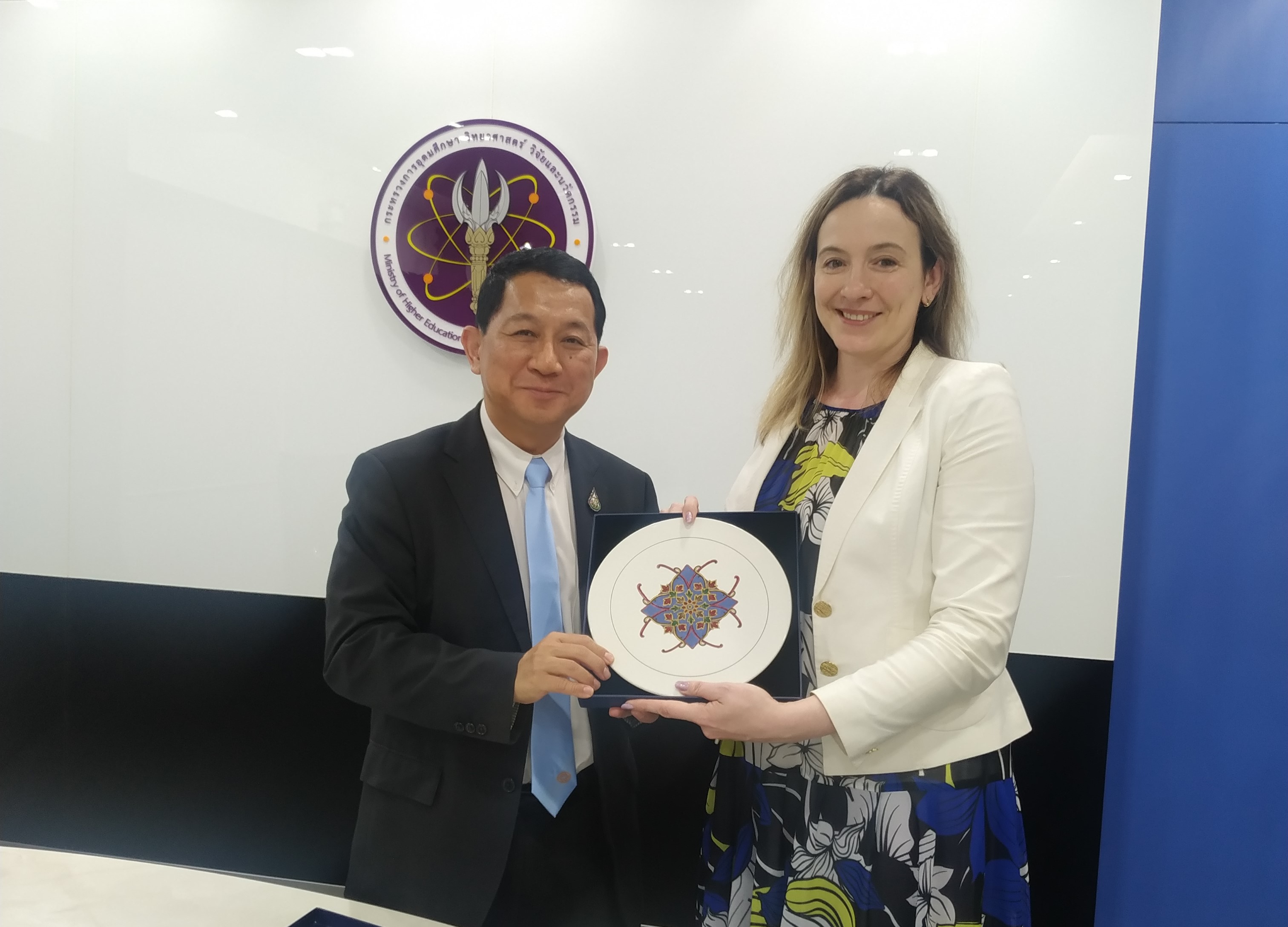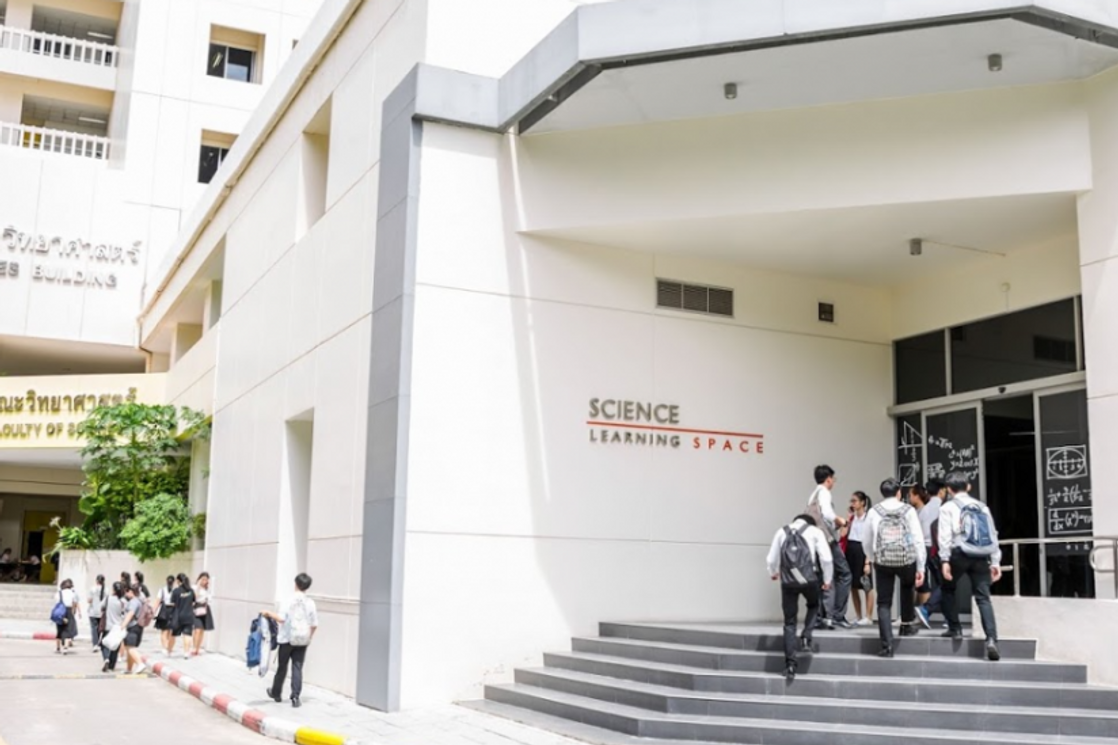HSE and Thailand's Mahidol University Sign Cooperation and Student Exchange Agreement

In mid-March 2023, a delegation of HSE University attended APAIE, a major annual educational conference held in Bangkok. At the conference, the HSE representatives organised a session, conducted negotiations with several universities, and met with high-ranking officials from government agencies and international organisations. Furthermore, during the conference, HSE signed a cooperation and student exchange agreement with Mahidol University, one of Thailand's top national research universities.
The annual APAIE Conference is one of the key events in higher education in the Asia-Pacific region. Vice Rector Victoria Panova led a large delegation from HSE to attend the conference in Bangkok. HSE campuses were represented by Vice President of HSE University-St Petersburg Manoj Sharma and Deputy Director of HSE University-Nizhny Novgorod, Dean of the Faculty of Management Denis Fomenkov.
Sessions and Negotiations
As part of the conference's business programme, HSE representatives collaborated with colleagues from Malaysia and Japan to conduct a session entitled ‘Increasing Sustainability and Diversity: New Approaches to Delivery for Students’. Maria Kiseleva, Head of the HSE University-St Petersburg International Office, moderated the session. Speakers included Vice Rector Panova and Yulia Grinkevich, Director for Internationalisation at HSE. The session highlighted the crucial role of education in the rapidly developing world and the significant impact of digitalisation and advanced technologies on the future of education.
Panova emphasised the major relevance of project-based learning methods. 'The key advantage of project-based learning is that it allows students to acquire competencies that cannot be obtained solely through classroom instruction. These skills primarily involve delegation of responsibilities and teamwork, negotiation, and decision-making—competencies that define the modern-day professional,' she said. 'We had a wonderful session and received a lot of positive feedback. Our international colleagues expressed keen interest in the projects implemented at HSE,' Kiseleva commented on the session outcomes.

As part of the APAIE 2023 business programme, HSE and Mahidol University—one of Thailand's top national research universities—signed a cooperation and student exchange agreement on March 14. The agreement aims to develop academic, scientific, and cultural ties, as well as promote joint research and academic mobility between the two universities. Under the agreement, Mahidol University students and faculty can visit any of the HSE campuses, and HSE students and faculty can gain international academic experience at the partner university in Thailand.
On March 15, the HSE University delegates and their colleagues from Mahidol University held a round table discussion on the topic ‘Russia and ASEAN Beyond Exchanges: Pooling Knowledge to Foster Global Development’. Manoj Sharma, Vice President of HSE University-St Petersburg, noted during the discussion, 'Our advantage is that as a strategic partner of the ASEAN region, Russia is well-positioned to address its challenges as a neutral and honest mediator that promotes socio-economic development and regional balance.'
Important highlights of the business programme included meetings with the First Deputy Minister of Education of Thailand, representatives of the University Mobility in Asia and the Pacific (UMAP) consortium of higher education institutions and partners, and the Association of Pacific Rim Universities (APRU). Equally significant were the negotiations with representatives of Thailand's leading universities, including Chulalongkorn University and Thammasat University, who have been partners of HSE University in education, research, and student exchanges since 2019. During the negotiations, the parties discussed plans to deepen and expand bilateral academic cooperation and expressed their commitment to working towards this goal.

The meeting with the leadership of the Economic and Social Commission for Asia and the Pacific (ESCAP), represented by Hamza Ali Malik, Director of the Macroeconomic Policy and Financial Development Division, and Adnan Aliani, Director of the Strategy and Programme Management Division, was highly productive. The parties reached an agreement to establish and further develop research cooperation, and to provide opportunities for HSE students to participate in internships at the ESCAP office. As part of the future academic cooperation with ESCAP, Hamza Malik will participate as a speaker with his special expert programme and give a talk to students at the Yasin International Academic Conference on Economic and Social Development organised and hosted by HSE University.

According to Denis Fomenkov, APAIE provides an excellent platform for establishing new partnerships and strengthening existing relationships in the Asia-Pacific region. 'Internationalisation remains one of the top priorities for HSE University-Nizhny Novgorod. It is crucial not only to provide students with more opportunities for international mobility, to welcome students from partner universities, and to create joint educational products, but also to foster collaboration between research teams,' he stressed. 'We have conducted negotiations with leading universities in Thailand, Indonesia, Malaysia, China, and Vietnam, and have agreed upon further steps in our main areas of cooperation. I would like to highlight the significant interest of universities in the Asia-Pacific region in the digital transformation of agriculture and digital technologies in general. This is an important area of focus for HSE University in Nizhny Novgorod.'
Visits to Campuses
One of the most vivid and memorable experiences was the HSE delegation's visit to the campuses of Thammasat University and King Mongkut’s University of Technology Thonburi (Bangmod Campus).
'Despite having a small number of international students (around 1%), Thammasat University offers a diverse range of English-taught courses in fields such as Business Law, Economics, and Thai Studies, which are available at two of the four university campuses. One notable feature of Thammasat University is its business school, which is the only institution in Thailand to hold what is known as the “triple crown” accreditation from AACSB, EQUIS, and AMBA. Fewer than 1% of the world's business schools have this prestigious triple accreditation,' explains Grinkevich.

HSE has not yet signed a cooperation agreement with King Mongkut's University of Technology Thonburi. The HSE delegation visited the university’s campus to learn more about the study and living conditions for students, the Institute of Field Robotics and its approach to object-oriented education, and the university's sustainable development policy. The HSE delegation was impressed by the academic potential of the university, with 63 out of its 150 bachelor's, master's and doctoral programmes being taught in English. This provides students enrolled in mobility programmes with a broad range of courses to choose from.

Potential areas of cooperation include engineering sciences, natural sciences, information technology, robotics, computer engineering, and sustainable development. Ksenia Gerasimova, Professor at the School of Politics and Governance of the HSE Faculty of Social Sciences, expressed a keen interest in sustainable development projects such as mangrove plantations. She believes this topic to provide a good foundation for potential joint projects.
Grinkevich emphasised that, in terms of the potential for academic exchanges, the availability of infrastructure is of utmost importance. At King Mongkut's University of Technology Thonburi, all students enrolled in mobility programmes are afforded the opportunity to live on campus in good living conditions for a fee.
HSE's Point of Presence
Vice Rector Panova and representatives of Thai universities emphasised the crucial role of humanitarian dialogue between Russia and Thailand, stressing their interest in facilitating exchanges of students and teachers within the ASEAN framework. 'In addition to short-term visits lasting for up to three months, these can include long-term stays for a semester or a year,' explained the vice rector. 'Talented Thai bachelor's students have the opportunity not only to stay with us for a semester under an exchange programme, but also to pursue a master's degree in areas which are particularly relevant to the Thai economy.'
The vice rector emphasised that HSE has the highest number of English-language master's programmes of any Russian university. She also pointed out the keen interest expressed by Thai applicants in programmes related to urban and regional development. Additionally, Panova suggested the possibility of establishing a point of presence for HSE at one of the universities in Thailand, stating, 'It would depend on the needs of the host country. If such a request is made, we would be happy to explore all potential opportunities.'
She emphasised that the hallmark of HSE University is its stringent quality control in education. 'Having a campus abroad doesn't necessarily guarantee the same level of quality,' the vice rector believes. 'Therefore, if our partners are willing to meet the stringent requirements set by HSE for our own educational programmes, we have the intellectual and methodological capabilities to implement such quality control measures.'

